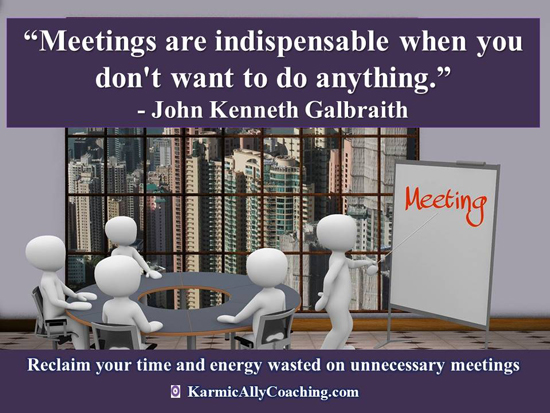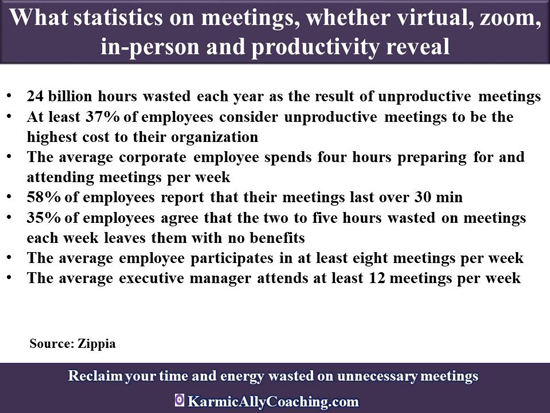This post has already been read 253 times!

How do you feel about meetings at your workplace? How about the ones that are really unnecessary?
Are you unable to complete your work because these meetings leave you exhausted and are eating up your time?
Meetings are important but just like adding too much sugar to your coffee or tea can make it taste poisonous, too many meetings spoil their effectiveness.
You end up working late to make up for lost time. Most probably, the quality of your work suffers from being tired after all those meetings.
And it’s not just in the corporate world. I remember an article from almost a decade ago in the Delhi edition Hindustan Times that caught my attention.
It was in the Government news section and titled “It’s official, far too much time goes into meetings”. The article was based on a survey conducted by a serving Indian Administrative Service officer and claimed that 60% of officers believed that they held more meetings than necessary.
It made for interesting reading.
You don’t have to be in the corporate world or anywhere for that matter to hold time wasting meetings.
Way back in the days when I was doing a consulting assignment in Belarus, the firm for which I was doing the project had a tendency to hold too many meetings at the whim of the Managing Director.
I had to attend each of the meetings which went on for hours without achieving much. The saving grace was a shot or two of vodka with caviar at the end, but the rest of the day was not very productive.
Considering the timelines of the assignment and the fact that from what the translator was telling me during the meetings, I finally summoned up the courage to talk to the owner of the company.
Using the skill of leadership presence, I made a case to be excused from the meetings unless my work was a part of the agenda.
Things smoothened out and I completed the project in time.

Research shows we are spending too much time in meetings and too little on actual work
Meetings are a daily or weekly part of the regular schedule for most workers.
However, these meetings might actually be detrimental to the workplace, especially if they have no clear purpose.
There are logical reasons for why meetings tend to multiply. They provide an opportunity to collaborate and learn from each other.
However, when they start to feel overwhelming or pointless, they may actually lower morale and productivity.
Research done by Zippia in 2023 on meetings, whether virtual, zoom, in-person and productivity revealed some amazing statistics.
While the focus was on the USA, I’m sure the numbers would be similar to other countries. Check them out.
- In the United States, there are around 55 million meetings held each week. That’s at least 11 million per day and over 1 billion per year.
- The average time spent in meetings per week is 3 hours, with 30% of workers reporting that they spend over 5 hours per week in meetings.
- Organizations spend roughly 15% of their time on meetings, with surveys showing that 71% of those meetings are considered unproductive.
- An estimated $37 billion is lost per year to unproductive meetings.
- Workers spend an average of 31 hours per month in unproductive meetings.
Here are some further insights their research uncovered:

Imagine what your workday would be like if meetings were less frequent and more productive!
While you may be diffident about telling the boss all those meetings are eating up precious time, it doesn’t mean you can do something about it within your sphere of influence or persuasion.
There are steps you can take on your own to cut down on meetings. However, you’ll probably make more progress if you work as a team.
Try these suggestions for transforming your approach to meetings.
5 ways to claw back time by reducing frequency of meetings
These are tactics that work when applied pro-actively.
- Consult your boss. Ask your boss if they’re interested in developing an overall strategy to make meetings more relevant.
- Clear the calendar. Do you attend weekly meetings whose origins are shrouded in mystery? It may be time to start from the ground up. Review each recurring meeting to ensure that it still serves a valid purpose.
- Call first. Make a quick phone call to see if you can resolve the relevant issues before asking your colleagues to attend a meeting. You could also try handling it on your own or asking another employee for assistance.
- Create meeting-free days. Take a day off from the conference room. Some companies have made a commitment to at least one day without meetings each week. This gives employees more time for tasks that benefit from deeper thought and fewer distractions.
- Opt out. If you’re tactful about it, you may be able to turn down meeting invitations without causing any friction. Explain your conflict and propose an alternative like using project management tools or creating internal reference materials. It also helps to have a supportive boss.
Be a real leader and make meetings more productive
What if you are responsible for arranging the meetings and driving them?
Applying your power base to get consensus and making sure you’re commanding the room from the beginning is a good start.
In addition, use the following tips to keep the meeting purpose and length under control.
- Prepare an agenda. Keep your meeting on track by circulating a written agenda. It will provide a sense of direction and help participants to stick to the main subject.
- Limit attendance. Most experts believe that meetings are more effective when they’re limited to about 8 participants. Larger groups often experience more difficulties with communication and decision making.
- Shorten the time frame. Why schedule an hour-long meeting when 45 minutes will suffice? Having less time encourages greater focus and fewer conversations about items unrelated to the agenda.
- Finish early. Give your colleagues an incentive to be concise. Make it a habit to end meetings ahead of time when the work is completed.
- Stand up. Try conducting some of your meetings standing up or walking around. You’ll be less likely to want to linger on a cushioned seat because you’re sleepy. You may also think and speak more clearly when you’re on your feet.
- Ban browsing. Do you want to join the ranks of companies that prohibit phones and other devices from meetings? On the other hand, you may be satisfied with a policy for muting phones and using devices only for tasks relevant to the meeting.
- Upgrade your technology. Then again, some technology may enhance your meetings. Use video conference calls and screen sharing applications to keep things interesting and accomplish more in less time.
One doesn’t have to have a title to be considered a leader as I’ve pointed out in one of my earlier blog posts. Our ability to demonstrate the qualities of a good leader are enough.
Real leaders care about their teams and co-workers time utilization
They strive to bring out the best in everyone. So, one other idea is to suggest providing leader training. Talk with your employer about providing training for employees who conduct meetings.
Meetings can encourage collaboration and strengthen professional relationships. Work with your employer to ensure that your meetings are essential and successful.




 I adhere to the Certified Coaches Alliance Code of Ethics and Standards. A copy is available on request.
I adhere to the Certified Coaches Alliance Code of Ethics and Standards. A copy is available on request.
 Let's Talk through the Connect Form:
Let's Talk through the Connect Form: